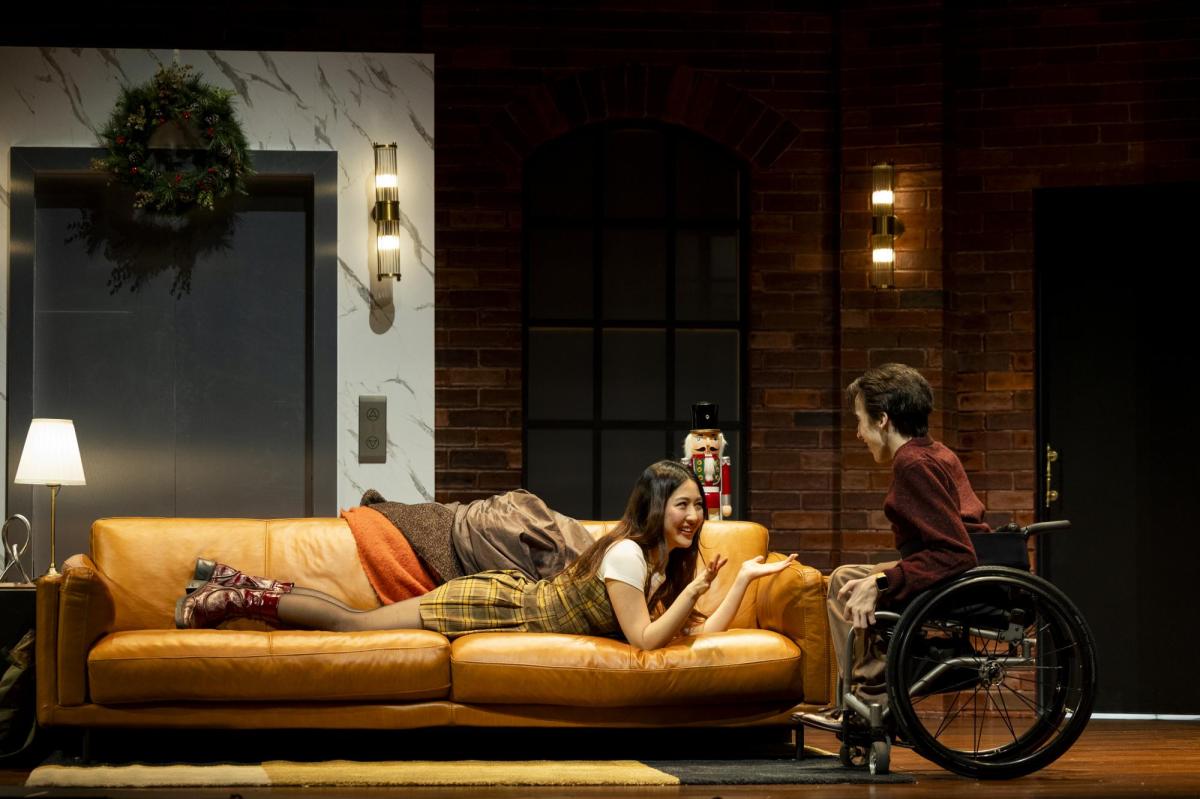If you’ve never heard of it before, you’d automatically assume that the Melbourne Theatre Company (MTC) production Cost of Living mines the precariousness of contemporary life and is all about monetary duress – after all, many of us have succumbed to near penury thanks to inflation and interest rates rises, but Martyna Majok’s play takes an expansive view beyond financial concerns to examine the connective push and pull in relationships – what is the cost of living in a modern world where the politics and economics of caregiving can be so fraught?
The play also brings to mind that Oscar Wilde aphorism of knowing the cost of everything and the value of nothing. Written in 2016, and premiered in the US, it won the Pulitzer Prize two years later, its humanistic themes clearly resonating with audiences and critics alike.
Cost of Living had earlier seasons this year in Brisbane and Sydney (it was a co-production), but Melbourne’s debut comes with a new cast and crew so it’s a refreshed iteration. From the outset it’s clear that this is a play that looks at living with a disability – indeed two of its four cast members are in wheelchairs – but to regard it through that reductive lens fails to consider the fact that Majok is actually concerned with the emotional and physical mechanics of how and why we care for one another. Though two of its protagonists have a visible disability (one acquired, one congenital), it’s a play about the giving and the taking: of care, of time, of the symbiotic need for human connection.
Set in New Jersey, it focuses on two separate stories: Eddie (Aaron Pedersen) is a former truck driver who finds it difficult to be alone with his ruminations and ends up gravitating back towards his former partner Ani (Rachel Edmonds) who’s a quadriplegic after a recent car accident. The unhappy history between them and her own reduced circumstances mean that Ani is initially resentful and distrusting of his offer of domestic help. Is he wanting penance for his behaviour? Are there still murmurs of love beneath the rubble of their relationship?
Meanwhile, in another narrative skein, Jess (Mabel Li), an impecunious graduate already ekeing out an existence with casual bar jobs, takes on the role of an aide to John (Oli Pizzey Stratford), a wealthy PhD student with cerebral palsy, after he puts her through a harrowing interview process. Jess, from an Asian background, and the first in her family to be born in the States, further introduces questions about the intersection between race, privilege and poverty when it’s discovered that a portion of her wages is sent home to support family. John, it should be remembered, may be disabled, but he’s also white and rich – her income is partially dependent on his goodwill.
Cost of Living alternates between these two storylines, with parallelisms in the way both couples navigate the responsibilities of care with the individual need for autonomy. The revolve set by Matilda Woodroofe depicts both households: John’s slick, stylishly furnished apartment and the less salubrious surrounds of Ani’s beige living quarters. (With cheerful naiveté Eddie implores her to paint them yellow for a dopamine hit.)
The cast handle their respective roles with heart and gravitas though there are moments of humour that break through. Fully occupying the contours of their characters, as Eddie, Pedersen is gruff and loud but with a sensitivity so close to the surface that means he is often weepy, as Ani, Edmonds is understandably frustrated, “pissed and sad” about losing access to bodily functions she’d previously taken for granted, as Jess, Li is unsure at first of how to treat someone “differently abled” and though highly educated, Stratford as John is haughty and impervious to undercurrents in his caregiver’s emotions despite his need for her labour.
It’s only toward the end that the two storylines intersect in a way that seems a little too neat and resolved.
It’s a credit to Majok and director Anthea Williams that Cost of Living does not shy away from depicting the actual physical demands that require daily assistance: the showering, shaving, bathing and getting dressed. The vulnerability, tenderness and awkwardness on show are so intimate it’s hard for the audience to look – but look we must, if only to understand the everyday realities required to prevail for those who are disabled.
Though it teases out power imbalances in various forms, ultimately, what’s important about this play is how it treats humans as wholes greater than the sums of their parts, so that disability becomes almost incidental. It also skewers the usual stereotypical portrayals of the meek and martyred disabled person: Ani is spiky and profane, enraged about her loss of independence. While, cushioned by his wealth, John is imperious and insensitive to those less financially fortunate. They, like all of us, are messy, flawed, individuals.
Read: Opera review: La Bohème, Athenaeum Theatre
So, in the end, what does give life value? Majok asks. Enough money to live with dignity and grace? A support system and persons willing to be there at your most desperate times? Cost of Living underlines the interdependence of people, how we all suffer loss and loneliness in whatever permutations, and how we can help one another nonetheless. This MTC production offers a nuanced look at disability and shows vulnerability and strength in equal measure.
Cost of Living by Martyna Majok
Director: Anthea Williams
Set and Costume Designer: Matilda Woodroofe
Lighting Designer: Richard Vabre
Composer and Sound Designer: Jethro Woodward
Intimacy Coordinator: Amy Cater
Voice and Dialect Coach: Matt Furlani
Assistant Director: Alistair Baldwin
Cast: Rachel Edmonds, Mabel Li, Aaron Pedersen, Oli Pizzey Stratford
Cost of Living will be performed until 19 October 2024.





